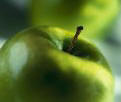|
An Apple a Day May Really Keep the Doctor
Away
By Salynn Boyles
WebMD Medical News |
|
June 21, 2000 -- It turns out that eating an apple a day
really does keep the doctor away -- but you've got to eat the peel. And no
fair skipping the apple altogether in favor of megadoses of vitamins in pill
form. Fruits and vegetables in their natural state are better, Cornell
University researchers say.
A study published June 22 in the journal Nature
offers more evidence that the health benefits of fruits and vegetables are
not easily packaged as supplements sold in pharmacies and health food
stores. Researchers from Cornell's Food Science and Toxicology Department in
Ithaca, N.Y., found that the antioxidant properties of one fresh apple were
equal to 1,500 milligrams of vitamin C.
"The pharmaceutical companies will not be happy with me,
but I think the consumer gets more health benefits from eating whole fruits
and vegetables," lead researcher Rui Hai Liu, MD, PhD, tells WebMD. "You get
much more antioxidant activity, you get a variety of antioxidants, and you
don't have to worry about toxicity."
The Cornell researchers suggest that a combination of
plant chemicals, collectively known as phytochemicals, found mainly in the
skin of apples, provide the bulk of the fruit's anticancer and antioxidant
properties. The cooperative activity of these phytochemicals, they argue,
has health benefits that are superior to those found in single compounds
like vitamin C, vitamin E, and beta-carotene, which have been widely studied
for their antioxidant activities.
Using colon cancer cells treated with
apple extract, Liu
and colleagues found that 50 milligrams of
apple extracted from the skins
decreased the cancer cell growth by 43%, while the same amount of
extract
from the flesh of the apple decreased cancer cell growth by 29%. Likewise,
50 milligrams of extract from apples with the skin on decreased liver cancer
cell growth by 57%, compared to 40% for samples
extracted from apples
without the skin.
"There is a huge amount of scientific evidence showing
that fruits and vegetables lower the risk of cancer and heart disease, but
scientists have mostly been isolating single compounds like beta-carotene
and vitamin C," Liu says. "Over the years, no single compound has been
proven to have a protective effect by itself. An apple could have hundreds
of phytochemicals. We think the combination is the important thing."
More than 900 different plant chemicals have been
identified as components of different fruits, nuts, grains, and vegetables.
Apples are rich in isoflavones and phenolics, but other widely studied
phytochemicals include lycopene, found in tomatoes; carotenoids, found in
carrots and citrus fruits; and allyl sulfides, found in garlic and onions.
It is believed that various phytochemicals help prevent cell damage, prevent
cancer cell replication, and decrease cholesterol levels.
Charles Halsted, MD, says evidence is mounting that
suggests taking vitamin supplements, even in large doses, does not provide
the health benefits of a healthy diet. Halsted edits the American Journal
of Clinical Nutrition (AJCN) and is a professor of internal
medicine at the University of California, Davis. He was not involved with
the study, but reviewed it for WebMD.
"I think the argument that natural sources of antioxidants
are better is a pretty sound one," he says, adding that AJCN will
soon publish studies showing a diet high in fruits and vegetables to be
protective against heart attacks and colon cancer.
"If you look at single compound studies, you see mixed
results," Halsted says. "For example, the early studies of beta-carotene
suggested that it protected against lung cancer, but later studies found
that it increased lung cancer risk. Single supplements may not be able to
provide the benefits of a healthy diet."
The Cornell study was funded, in part, by the New York
Apple Research Development Program and the New York Apple Association, and
Liu is an eager spokesman for their favorite fruit.
"You should eat an apple every day," he says. "Everybody
in my family gets an apple a day. We go through several thousand apples a
year."
Vital Information:
- Many of the antioxidants in an apple are in the skin,
which might have cancer-fighting properties.
- Researchers think it's better to get antioxidants from
fruits and vegetables than from dietary supplements. These naturally
occurring plant chemicals, or phytochemicals, may work together to fight
cancer and other disease.
- As scientists study antioxidants, many say they are
beginning to believe it's the combination of different phytochemicals
working together that bring good health.
Source:
http://my.webmd.com/content/article/26/1728_58624.htm
(more news) |
